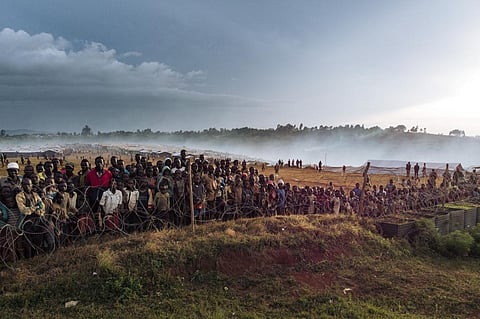

Central Africa is host to the largest community of internally displaced persons in Africa. The countries in this region include Cameroon, the Central African Republic (CAR), the Democratic Republic of Congo (DRC), Republic of the Congo, and Rwanda.
Just four of these account for more than 7 million internally displaced people. At the top of the list, the DRC alone hosts more than 5.5 million.
The main cause of these high numbers is conflict, both national and international. Conflicts have tormented the region for decades.
For example, the protracted armed conflicts and rebellions in the Democratic Republic of Congo and the Central African Republic have contributed to the instability of the region, with serious effects on their neighbours, some of which have been directly involved in the conflicts.
In addition, the militant Islamist group Boko Haram has emerged as a major threat in Central Africa. And Burundi faces persistent political tension and violence.
The internal displacement crisis is further driven by natural disasters, such as flooding.
Displaced people are a highly vulnerable group. They’re forced to live in crowded and unsanitary camps. They’re also fleeing violence and are surrounded by active fighting situations. For example, in February 2022, in Plaine Savo camp (DRC), a militia group killed more than 60 civilians.
All over the world, the management of internally displaced people can be a challenge. It requires resources (for example, food and tents) and political will.
As a scholar with expertise in the legal promotion and protection of the rights of the people “on the move” in Africa, I argue that adopting a specific regional protocol could ease the management of displaced people in the region. A protocol is an instrument that creates legally binding obligations to international law.
In this case, the protocol would, among other things, legally bind countries to respect not only the new provisions contained in it but also the provisions of the Kampala Convention. This is a continent-wide treaty which the African Union (AU) adopted in 2009 to protect and assist internally displaced people in Africa.
The mechanism of enforcement established in the protocol should complement and help to enforce the provisions of the Kampala Convention.
The Kampala Convention provides solutions for the return, relocation or resettlement of the internally displaced. It also provides for displaced people to seek redress for housing, land and property losses. Physical, mental and other types of harms are included too.
But it’s not clear whether these services are accessible in practice. The problem is that the Kampala Convention is for the whole continent and lacks clear enforcement mechanisms.
The Central African region has a massive problem with displaced people. Currently, the main actor to provide assistance in the region is the UN refugee agency - UNHCR. And its regional budget for 2023 already looked insufficient by late October 2022, repeating a pattern seen in the past three years.
A sub-regional treaty, or protocol, could focus on this specific situation and create a better management plan. There’s no subregional regime for internally displaced people anywhere in Africa. Countries are focusing on other problems or consider the plight of displaced people to be a domestic affair.
My proposal is an attempt to do something concrete to change this.
The protocol must include a number of articles dedicated to stringent enforcement of the provisions of the Kampala Convention. To do this, it should create an institution that monitors and ensures the implementation of the Kampala Convention specifically for the Central African region.
For instance, the Kampala convention states that though states bear the primary duty and responsibility for providing assistance and protection to internally displaced people within their territory, they must cooperate with each other in doing so. The proposed institution should ensure that states in the subregion share the financial and material burden of managing displacement situations.
Drafting such a protocol requires a big effort and the strong political will of the Economic Community of Central African States (ECCAS), made up of 11 countries.
The regional community should lead on the protocol. It is easier for 11 actors of the region to reach agreement than to include 55 AU members in discussions. For example, at the continental level discussions on free movement of people which started in 1991 are still going on. Only four countries have ratified the 2018 Free Movement Treaty. By contrast, in the Economic Community of West African States (ECOWAS) area, a Protocol on Free Movement has existed since 1979, and it has been implemented for the most part.
The protocol could enter into force after ratification by a number of ECCAS members and a “committee” of politicians and magistrates could be created to enforce its provisions.
This committee would hold primary responsibility for the enforcement of the protocol.
Funding for the protocol’s activities should come from the ECCAS Commission, which is financed by its member countries. Member countries must turn conversations about regional solidarity into solid obligations. These include financial commitments and assistance. A special fund to assist internally displaced people could be created.
This isn’t a far-fetched suggestion. Recently, quests for solidarity and responsibility sharing have been high on political agendas, especially in the aftermath of emergencies triggered by political tension in several ECCAS countries. The DRC, for example, acceded to the Kampala Convention only on 3 February 2022 – the day after the killing in Plaine Savo.
Cristiano d'Orsi, Senior Research Fellow and Lecturer at the South African Research Chair in International Law (SARCIL), University of Johannesburg
This article is republished from The Conversation under a Creative Commons license. Read the original article.